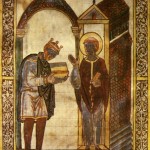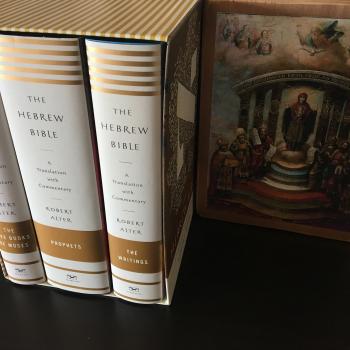Jesus says in Sunday’s Gospel reading: ‘Peace I leave with you; my peace I give to you. Not as the world gives do I give it to you. Do not let your hearts be troubled or afraid’ (John 14.27). These words are also the preface in most Christian liturgies to the ‘peace,’ the section in the Eucharistic celebration where we greet each other in the name of Christ, reconciling with those whom we have wronged and joining together in love before partaking of the body and the blood together.
This is more than liturgically appropriate–arguably one of the earliest parts in liturgical development–because the peace’s context is what has come to be known as the ‘Farewell Discourses’ in St. John’s Gospel, the conversation (well, OK, it’s more like a monologue with a few leading questions) where, in light of ‘going to the Father,’ the Lord enjoins his disciples to love one another as he has loved them, to wait for the Paraclete who will lead them deeper into the ontological truth of the death and resurrection, and to live so deeply in the truth that the Father and the Son make their home with them even as the world hates them and persecutes them. The emphasis on reconciling love and passing the peace pervades the other lectionary readings as well. In Acts 15, the Council of Jerusalem is convened to deal with the theological assertions of a party of Jewish Christians who want the Gentiles to get circumcised and follow the Mosaic dietary laws. The Council concludes that non-Jewish Christians only have to do the bare minimum as they find themselves at peace with their Jewish brothers and sisters as part of the new covenant: don’t eat meat sacrificed to idols, don’t eat blood, don’t engage in porneia. By the time of the second reading in Revelation 21, it’s revealed that everyone here belongs to the New Jerusalem, the new Israel, the new Temple, shining with the glory of the Lord, who is the Lamb (thanks, Balthasar). The mystical communion of the New Jerusalem founded on an ontology of mystical love was aptly demonstrated to me on Sunday morning: at the free church that I occasionally attend with my wife (a likely surprise to everyone who thought I considered non-Anglican churches beyond the pale), the pastor preached on communion as a practice of reconciling love that cuts across the ecclesial boundaries we erect against each other. Without knowing what the lectionary readings actually were, this pastor (in my humble opinion) represents a sign that God still mystically unites his church catholic despite our intentional divisiveness, for he was practicing ecumenism as an evangelical without even being conscious of it.
This ‘mystic, sweet communion’ might well be applied to those who seem inadvertently and unintentionally to be set up as the arch-nemeses of this blog: the young and restless Protestant tribe dubbed the ‘neo-Calvinists.’ Mark Driscoll is in trouble again (what’s new?): at the recent Catalyst conference, he said something to the effect that because he knows his Maker, who is the maker of the environment, and he is certain that God the Creator will burn the whole thing up, yes, he drives an SUV. He followed this with a (typically) sexist joke that those who drive minivans are ‘mini-men.’ Upon making these remarks, my Facebook news feed erupted in anger, some with passive sighs, others with a call to arms, still others disavowing any connection with Driscoll. One friend even resurrected an old allegation that Mars Hill Church is in fact a ‘cult.’
As I’ve said before on this blog, I do not think the ‘cult’ accusation is very helpful and that Driscoll’s sectarian tendencies are better read as a psychological resistance to his longing to return to his roots as an Irish Catholic. In light of these Catholic musings, I wonder if diatribes against the neo-Reformed tribe don’t in fact stoke their sense of justification by sixteenth-century polemics alone. I wonder if instead passing the peace to them might in fact provoke them to reflect on their schismatic tendencies and in turn infuse them with such a love that will cover a multitude of sins.
What would it look like to pass the peace to folks like Mark Driscoll and John Piper? I think it’s by arguing that they secretly wish they were Catholic, that they really don’t intend to be schismatic but long instead for deeper communion with the rest of the church catholic. The trouble is that they’ve built their pastoral careers on constructing congregations around hard Reformed Protestant theologies, so they find themselves between a rock and a hard place. It is thus up to us to extend a hand of friendship as they struggle between ideological (they would call it ‘doctrinal’) purity and their ontological reality.
I have argued sufficiently in the other post that Driscoll is a closet Catholic in denial, so I will not reprise my arguments here. Instead, in this post, I will subject one of his teachers, John Piper, to a similar (but briefer) treatment. (Incidentally, this treatment has already been undertaken by a hyper-Reformed blog seeking to undermine Piper’s credibility as a Calvinist. Where they wax uncharitable, I will attempt to be charitable to a fault.)
Piper put forward a (likely unintentionally) schismatic argument that if he were to have a conversation with the pope, he would ask him whether he believes that we are justified by faith alone and whether the righteousness of God is directly imputed to believers through their act of faith. If the pope were to disagree with this formulation, Piper would declare him a heretic. See for yourself:
When Pope Francis was elected, Piper put forward a clarifying statement, one that incidentally showed up on my news feed at the same time that Southern Baptist theologian Al Mohler denounced the papal office as Antichrist altogether. (I will subject Mohler to Catholic treatment in a future post; stay tuned.) Walking back his comments on Catholicism as a ‘heresy,’ Piper admits:
I am thankful that God is willing to save us even when our grasp of the gospel may be partial or defective. None of us has a comprehensive or perfect grasp of it.
Nevertheless, God’s mercy is not a warrant to neglect or deny precious truths, especially those that are at the heart of how we get right with God. And the teachers of the church (notably the Pope) will be held more responsible than others for teaching what is fully biblical.
While refusing to walk back his absolutist statements on imputation (you can’t cede all your ground without completely losing face, you know), this, in the words of gay Catholic theologian James Alison, is nonetheless an attempt to ‘lower the temperature’ and ‘loosen the screws.’
Piper can do this because the figure in the theological background for his entire theological system is Jonathan Edwards, a Puritan preacher whom I will also argue had loose Catholic tendencies (pax, Edwards). Piper draws from all parts of Edwards to build his theological system, from Edwards’s Lockean tabula rasa in his understanding of the process of Scriptural and scientific exegesis, to Edwards’s meditations on beauty to build a theology of Christian hedonism (i.e. that we exist to glorify God by enjoying him forever), to Edwards’s marriage to Sarah Edwards to build a case for gender complementarity (these themes emerge even more prominently in their daughter Esther Edwards Burr’s diary), to Edwards’s late evangelistic efforts to indigenous peoples to build a case for risking your life for missions (Piper likes David Brainerd too, btw, both of whom, in Piper’s reading, did not waste their lives by becoming too comfortable in academia), to Edwards’s treatment of religious affections to build a case for a Reformed charismatic theology (putting him in line with Sovereign Grace Ministries, the systematic theology of Wayne Grudem, Louie Giglio’s Passion conferences, etc.), to Edwards’s understanding of the freedom of the will to build his seven-point ‘double predestinarian’ Calvinism, to Edwards’s decisive handling of the medically pornographic ‘Bad Book Case’ to fight lustful thoughts in his own life, to Edwards’s long tenure as a pastor to argue that all of these metaphysical musings are precisely the work of pastoral ministry. Edwards, in turn, had an ironically high sacramental theology for a Puritan, which led to him getting fired from his Congregational Church for changing the mode of communion from his father-in-law Solomon Stoddard’s ‘converting ordinance’ to a members-only sacrament (or whatever is closest to sacrament that a Puritan can be comfortable saying: means of grace?) that could only be taken if you first inspected yourself for sin and if you weren’t under church discipline for ongoing sin in your life. (As an aside, I would put my finger here to understand Mars Hill’s bizarre church discipline cases: they’re attempts to do right by Piper qua Edwards. For a Catholic parallel, see Bishop Allen Vigneron’s suggestion that Catholics who differ on church teaching on abortion and same-sex marriage should not take communion.)
Of course, not all readings of Edwards are oriented to Catholicism; Sang Hyun Lee’s interpretations are notable examples. But you get the point: Piper is a closet Catholic because he reads Edwards as a closet Catholic. (In fact, Edwards’s work can be read as a fully catholic articulation of the Christian faith, as Miroslav Volf tacitly suggests in his reading list in A Common Word Between Us and You.) They both seem to have a fairly high sacramental theology. They take pleasure in contemplative spiritualities. They even both reinforce the gender complementarities in Catholic holy orders. And if you’ve given Piper’s oeuvre a fair reading, you’ll know that he knows the Tradition quite well (never mind if you agree with his assessments) through his discussions of Athanasius, Anselm, and even Aquinas in Desiring God and The Pleasures of God.
The real trouble, then, is that they are both given to excess in their insistence that because they are Puritan, they cannot be Catholic. These excesses in turn can be corrected.
Mirroring an Edwardsian ‘personal narrative’ of divine conversions, I personally know that these excesses can be corrected because I myself am a neo-Reformed convert. I had a conversation with someone this afternoon who said that they got into the neo-Reformed thing because they were looking for something more solidly Protestant after being in a ‘loosy-goosy’ evangelical church, and I daresay that my experience was the same. In university, after passing through a progressive Catholic school that taught me the basics of liberal Protestant biblical criticism and liberation theology as well as Chinese evangelical congregations that could be framed as ‘more grace than works,’ I got into the work of Driscoll, Piper, Mahaney, Harris, Chandler, Bradley, Keller, etc. in university because their Protestant-speak was so appealing. My wife, whom I had attempted to date (rather, court) at the time, tells me that I was kind of an absolutist jerk at the time, and I daresay most of the women who also rejected my dating advances at the time would make similar comments. (So much for the neo-Calvinist expertise on biblical courtship.)
However, as they say in these neo-Reformed circles, God’s grace is truly irresistible. When I was in high school, a Catholic priest planted just the right sort of seed in my proto-Reformed heart (mind you, for readers who wax critical of Catholicism due to its recent scandals, just as a cigar is sometimes only a cigar, sometimes a seed just a seed). He asked me what we were learning in school, and I replied that we were reading Jonathan Edwards’s ‘Sinners in the Hands of an Angry God’ in AP US History. I explained that Edwards’s vision of God as a fearful judge dangling sinners like a spider over the pit of hell was sure to shake any complacent non-Christian out of their wits and send them running to Christ for salvation, just as people did precisely when Edwards was reading that sermon in his New England church. I thought this would resonate well with the Catholic priest; the Fatima prayer is, after all, ‘Oh my Jesus, forgive us our sins, save us from the fires of hell, and lead all souls to heaven, especially those most in need of thy mercy. Amen.’ Or as the Death Cab for Cutie song goes, ‘In Catholic school / as vicious as Roman rule / I got my knuckles bruised by a lady in black. / And I held my tongue / as she told me, “Son, / fear is the heart of love.” / So I never went back.’
But this Catholic priest looked confused. Genuinely bewildered, he asked me, ‘Is God angry?’ I sat there speechless, flabbergasted, in fact, probably somewhat infuriated at these Catholics who don’t take doctrine seriously. But he continued, ‘If God is love, can he really be that angry?’
You could say that this priest didn’t know the first thing about Edwards’s oeuvre. You could say that focusing on ‘Sinners in the Hands of an Angry God’ fails to take into account Edwards’s metaphysical reflections on the Trinity, his explorations of beauty, his probing into religious affections, his insights into voluntary agency.
Or you could read it another way. You see, this priest was a devotee of the near-equivalent Catholic figure of Edwards to Puritan Christianity: Hans Urs von Balthasar. Both, after all, put beauty close to the heart of their theological reflections, and both talked an awful lot about ‘the glory of the Lord.’ I am aware that Karen Kilby has taken Balthasar to task for his worst speculative excesses and uncritical sexism. However, one excessive theologian can correct another theologian’s excesses, so another possible interpretation is that my Catholic priest friend was using Balthasar to correct Edwards’s worst excesses. Even if Balthasar were excessively speculative, he was able to check Edwards’s excessive morbidity and obsession with hell. Mind you, whatever you think of Balthasar’s ‘dare we hope all men to saved’ argument, Edwards can be a bit off the deep end with his ‘no, they burn’ answer at times.
It was this Balthasarian seed that drew me deeper into the bowels of Anglicanism, and in particular, a view of Anglicanism in which the state’s co-optation of the church is not necessarily the definitive view of the Church of England. After all, the question this priest asked me was a sincere one: how does this excessive view of hell display the glory of the Lord? While Piper might argue that it displays the absolute sovereignty of God, Balthasar would be quick to note that this sovereign Lord descended into hell on Holy Saturday, emptying himself of power to go to the dead. It is this hiatus, the silence in the death of God, that the logic of our theology is re-constituted, where the beautiful glory of the Lord is most definitively seen in the figure of Jesus, the one who died, the one who is risen, the one who will come again.
Our Sunday Gospel tells us that the Paraclete will draw us into all truth, that is, as Joseph Cardinal Ratzinger put it in his dialogue with critical theorist Jürgen Habermas (whom he was attempting to draw into all truth as well), the ontological reality that it is this mystic, sweet communion that holds the world together. Assuming that the Holy Spirit guides and directs the neo-Calvinists as our fellow brothers and sisters in Christ, they will (of course) be drawn with us into all truth, which means that, if they haven’t already, they will necessarily recognize the ontological reality that we recognize, and the Father and the Son will come to them and make their home with them, along with the rest of us. Our worst excesses will be corrected; our mystic sweet communion will come to fruition. We thus pass the peace to our neo-Calvinist brothers and sisters (yes, believe it or not, there are women in this tribe), acknowledging the peace we have with them even if they can’t bring themselves to acknowledge the peace they have with us.
The passage that was read at my wedding was 1 Corinthians 13. Many will (of course) complain that the passage is not about marital love, that it is in fact about ecclesial love, and that to use it in a wedding is to join Hallmark in taking it out of context. Our Anglican priest’s homily, however, emphasized love within the church over the pride that ‘puffs up,’ placing marriage as a sacrament within the context of the church, and I suspect that it is because of those homiletical reflections that I can’t get the passage out of my head as I conclude this post. I realize that when St. Paul says that when he was a child, he spoke like a child, he thought like a child, he reasoned like a child, he is positing a contrast between the present in which we see through a mirror dimly and the eschatological future when of faith, hope, and love, only love remains. But because the church mysteriously lives an eschatological reality in the present, I can’t help but think that a bit of eisegesis is in order. You see, when I was a child, I spoke like a schismatic, I thought like a theologically insecure neophyte about fundamental doctrines, I reasoned like a ‘solid’ Protestant with an overly romanticized view of the sixteenth century. But now that I have become an adult, I have put childish ways behind me, trading schism for communion, hopefully growing deeper into the truth that holds the world together, the realization that, as Stanley Hauerwas puts it in A Better Hope, ‘the worship of such a God [who works through the church] means that we must pray and pray fervently for the reconciliation of Catholics and Protestants, as our very division wounds not only ourselves but the world itself’ (p. 45-46). I can’t wait for my neo-Reformed brothers and sisters to do likewise.
In this way, Driscoll’s most recent debacle need not be interpreted as him going off the deep end as a neo-Calvinist participating in the worst excesses of American Christianity. Instead, the poor guy is kicking and screaming against the Holy Spirit leading him into all truth. We should thus not issue a green Christian diatribe against him, castigating him for his idiotic sexist and anthropocentric jokes that we take to be a pox on the face of the contemporary church catholic. We should rather extend the peace in the hope that he will be at peace as the Father and the Son make their home with him. Pax Christi.












